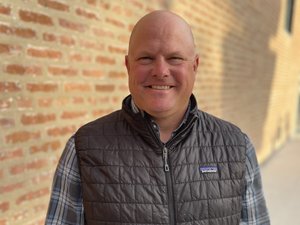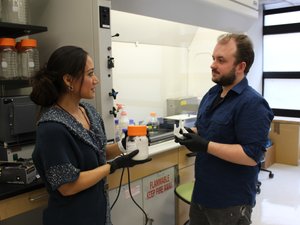What if your shirt, sensing the rising hair on your arms and your increasing heart rate, could tell you were in danger and send an alert to your loved ones?
As wearables move beyond the wrist, integrating into clothing, jewelry, and footwear, the abilities of increasingly inconspicuous biometric sensors woven into the fabric of our clothing is similarly expanding. For entrepreneurs experimenting in this space, it means that the ability of wearable tech is going to be less about the device, and more about what software can do with sensors built into the device.
That's what the founders of Anansi are betting on. When we checked in with the startup last fall, founder Nikita Parikh (pictured above), a University of Illinois Urbana-Champaign engineering alum, aimed to build a wearable for the wrist that could sense when the wearer was in danger and dial 911. However, as her team continued to develop tech and study the market, they realize that they were behind on hardware manufacturing but ahead of the curve on software that can accurately read biometric sensor data.
So they decided to move away from competing with companies spending "billions" on creating hardware, said Matthew Barron (pictured above), a Booth student who recently joined the Anansi team, and play to their strengths.
"This duplicative effort of being a hardware company and software company was going to distract us from what we really are and what we want to be focused on: a software company that can do emotion-based recognition," he explained.
"We're now exclusively focused on is creating the software that leverages sensors in wearable devices to recognize specific emotions and automatically send notifications based on those detected emotions," he added.
Their product is a proprietary algorithm that can interprets sensors on wearables and sends automatic notifications based on emotions. Barron said the most feasible application at the moment is measuring fear, then sending alerts to the user who can confirm their device should notify contacts or authorities. But the sensors they use, which can measure biometrics such as heart rate and skin tension, could also be used to measure how calm or anxious a person is throughout any given day.
They'd also like to expand to medical applications such as seizure and fall recognition, using accelerometers and gyroscopes.
However, the problem with innovating for the future of wearable tech, is that wearable tech is still in relatively rudimentary stages and hasn't reached critical mass--yet. Though analysts have predicted the wearable tech market will increase significantly over the next few years, hardware manufacturers are still on-boarding the first wave of adopters. And Anansi is looking even one step past that, to more sophisticated sensors that can read blood sugar and monitor heart rate activity.
Barron admitted that not all wearables are leveraging the sensors they need, so they're making a bet that wearable manufacturers are heading in the same direction. In the meantime the startup is sponsored by Microsoft, and have been testing their product on Microsoft Band 2 which Barron said has the sensors they need for their software.
The startup has already started to talk with heart rate monitor companies, and they aim to sell their software license to major hardware and software companies working on wearable tech. They currently have an minimum viable product, and are competing in UChicago's New Venture Challenge next month.








